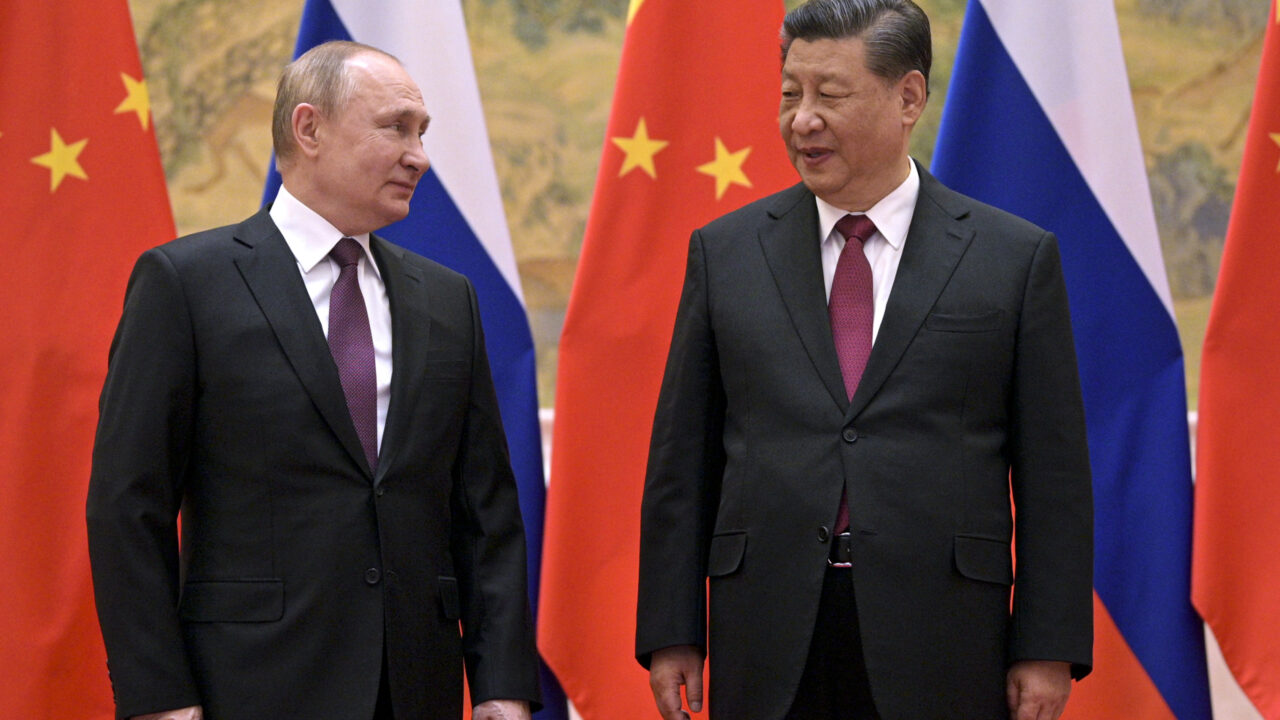Brothers (not yet) in arms: China-Russia relations a year into the war in Ukraine
China’s ‘peace plan’ for the war in Ukraine merely underlines its Russia-friendly perspective and desire to protect its own interests
China’s top diplomat, Wangi Yi, recently concluded a tour of Europe. His stop in Germany at the Munich Security Conference featured an announcement that China would set out its “position on the political settlement of the Ukraine crisis”. This was promptly mistranslated by Western commentators as “China’s peace plan”, generating an abundance of column inches. Beijing officially published the ‘plan’ on 24 February, the anniversary of Russia’s full-scale invasion of Ukraine.
The content of the document seems benign. It calls for the resumption of peace talks, respect for the sovereignty of all countries, and the abandonment of the “cold war mentality”. It also frames “political settlement” as the best way to maintain the stability of industrial and supply chains and facilitate grain exports. Finally, it argues for a halt to the implementation of unilateral sanctions and the reduction of strategic risks related to nuclear proliferation.
But the 12-point ‘plan’ does not present any actual solutions. In fact, it merely reiterates Beijing’s standard talking points on the war in Ukraine – which are closely linked to its Russia-friendly perspective and its own strategic interests. European leaders need to view both Wang’s tour and the new document in that context: as part of a broader charm-offensive aimed at reviving Beijing’s standing in international affairs while maintaining its deep and longstanding relationship with Moscow.
Indeed, China’s position implicitly legitimises Russia’s behaviour and leaves the door ajar for concessions to the Kremlin. The document does not entertain the idea that Russian troops should withdraw from occupied Ukrainian territories. Moreover, the Chinese leadership underpins its call for a return to the negotiating table with the argument that a region’s security should not depend on the expansion or strengthening of military blocs. This framing clearly supports Moscow’s discourse that NATO expansion “provoked” the Kremlin into action in Ukraine. It also serves Beijing’s aim to weaken US-led organisations such as NATO.
But Europeans should not brush off the ties between China and Russia as merely a tactical partnership. The ‘peace plan’ underlines the consistency of Beijing’s approach towards Russia’s invasion of Ukraine, which has long been characterised by endorsement of Moscow’s narratives regarding the war, its origins, and its meaning. It is symptomatic of Beijing’s unwavering partnership with Moscow – or as China’s leader Xi Jinping and the Russian president Vladimir Putin put it in February 2022, their “friendship without limits”.
This is not a new development. Beijing has shown willingness to strengthen ties with Moscow throughout Xi’s decade-long rule. Moscow and Beijing share many ideas about the nature of the world. Most fundamentally, they believe that the Western-led international order and its underpinning rules and values constitute an existential threat to the current Chinese and Russian regimes. So, the glue that holds Xi and Putin together is a joint struggle against so-called Western hegemony.
The glue that holds Xi and Putin together is a joint struggle against so-called Western hegemony
This provides fertile ground for cooperation in areas as varied as politics, economics, ideology, the military, and people-to-people relations. The relationship is asymmetrical, and Beijing has the upper hand in economic terms. But Russia can still provide support to China, for example in key aerospace technologies and nuclear weapons, not to mention an abundant supply of cheap energy sources. Despite the threat of secondary sanctions, trade between the two countries boomed last year. And recent data suggests that China has found ways to supply Russia with critical components such as microchips. No alternative partners or game-changing events are in sight. Moscow and Beijing will therefore continue to support each other’s core interests – notwithstanding the belief in some quarters that China has been distancing itself from Russia in recent months.
For instance, at the G20 summit in November last year, Xi agreed with US president Joe Biden that a “nuclear war should never be fought and can never be won”. Many commentators then jumped to the conclusion that China had “joined in condemnation of nuclear threats”. But Xi’s position is consistent with China’s longstanding nuclear doctrine – which functions mainly at the level of rhetoric. He used this tactically to appease Western politicians and audiences who are more than willing to project their own desire to see China as a responsible actor turning away from Russia. This narrative, in turn, helped to create a false image of China as a neutral actor.
But Moscow understands Beijing’s position on nuclear threats very well – and knows it will not translate into a deterioration of bilateral relations. In early 2022, China, Russia, and three other nuclear-weapon states signed a joint statement on preventing nuclear war and avoiding arms races. But Moscow’s and Beijing’s rhetorical support for key international issues should not be taken at face value: Russia turned to direct nuclear threats for political reasons, while China’s conciliatory tone serves its own political purposes.
For Beijing, the worst-case scenario for the end of the war in Ukraine is Russia’s complete failure and subsequent regime change. The Chinese leadership will go to great lengths to prevent this from happening. This could even go beyond China’s current rhetorical and economic engagement and translate into bolder attempts to strategically support Russia – as, for example, US secretary of state Anthony Blinken has suggested regarding China’s consideration of supplying “lethal support” to Russia.
Here, the definition of “lethal support” is crucial. For instance, the Chinese microchips currently finding their way to Russia may not be cutting-edge, but they can still strengthen Kremlin’s war machine over time – albeit at the cost of a regression in the quality of its equipment. Moreover, anecdotal media coverage has begun to cite intelligence sources claiming that China has begun to provide more direct military support for Russia. Evidence of this is yet to emerge. But it would be prudent to treat such a probability as a departure point for a broader debate on the long-term implications of Beijing’s support for Moscow’s revisionism, whether “lethal” or not.
Europeans should not misinterpret China’s charm offensive as a reason to encourage Beijing to engage in direct mediation with Russia. Beijing is not a neutral actor; it has an active interest in reshaping Europe’s security architecture to weaken NATO and other US-led initiatives. Europeans should recognise the contradiction in characterising China’s position on the war “pro-Russian neutrality”. There is no such thing.
The European Council on Foreign Relations does not take collective positions. ECFR publications only represent the views of their individual authors.



